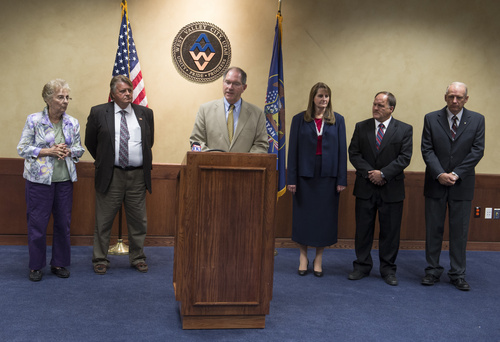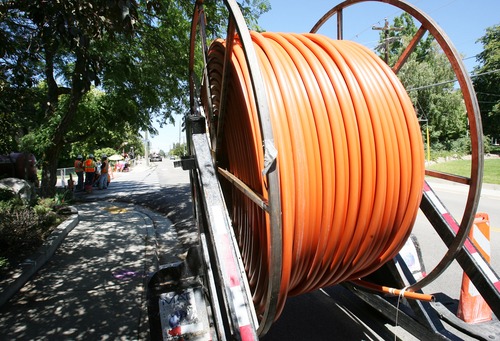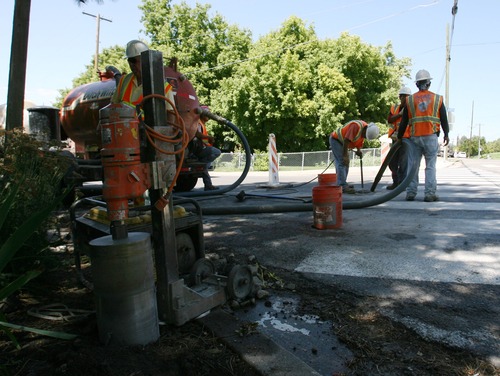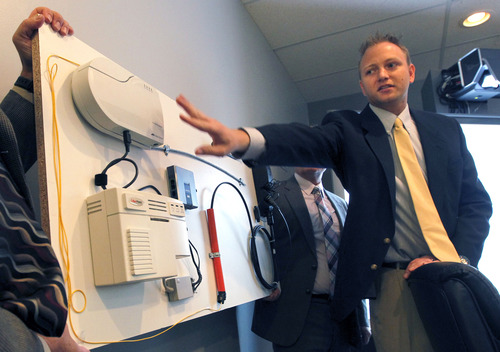This is an archived article that was published on sltrib.com in 2014, and information in the article may be outdated. It is provided only for personal research purposes and may not be reprinted.
The strange 11-headed creature known as UTOPIA is slowly mutating into something new as leaders struggle with its growing debt burden on city budgets.
Uncertainty persists months after a dramatic split among the 11 Wasatch Front cities overseeing UTOPIA, the high-speed fiber-optic network that remains partly built and financially troubled more than a decade after its birth.
Six UTOPIA cities voted over the summer to proceed with a detailed study by Australian investment giant Macquarie Capital Group of a public-private partnership to finish, upgrade and run the system at a profit for 30 years. The other five cities rejected the proposal by Sydney-based Macquarie in view of robust opposition from residents.
In the ensuing weeks, legal and political questions posed by that rift have proved so complex that even after extensive talks, none of the major players knows for sure yet where UTOPIA is headed.
"I'm still very optimistic that we will come together," Murray Mayor Ted Eyre said. "But that is a difficult thing to do with 11 cities, each with very different demographics and many other issues."
All agree the UTOPIA debate is far from abstract. What city leaders decide will affect their nearly 452,700 taxpaying residents, who remain on the hook for more than $450 million in bond obligations the network still owes, whatever its future.
"That doesn't go away," Layton Mayor Bob Stevenson said of the debt. "So it'd obviously be better to make this work and pay for it than to let it fail and still have to pay for it."
All sides also seem to agree that shutting down UTOPIA — a move critics occasionally suggest — would be catastrophic, with potential to wreck city credit ratings and spark a storm of lawsuits from network customers and business partners.
"Going dark is something we don't even want to think about,'' said Kane Loader, city manager at Midvale and an eight-year member of UTOPIA's board. "We would work feverishly to do whatever we can to prevent that."
—
Network slowdown • West Valley City, Layton, Midvale, Tremonton, Brigham City and Perry now await Macquarie's in-depth findings early next year on engineering, legal and financial aspects of its proposal.
Those cities also make up a voting majority on UTOPIA's governing board, leaving non-Macquarie cities — Murray, Centerville, Orem, Lindon and Payson — in limbo until the review is done.
That reportedly has sidetracked discussions with other private-sector suitors and Internet service providers interested in UTOPIA, including a proposal from Utah-based broadband provider First Digital.
"I'd like to have all options on the table," Orem Mayor Richard Brunst said. "What I really see here is a sleeping giant. Our residents want fiber. We have great potential for the future, but we need to move forward."
Mayors in the pro-Macquarie cities also have postponed a once-fast-tracked mail-in poll of their residents regarding the proposed deal.
Initially envisioned for the Nov. 4 ballot, the advisory vote has been pushed past the holidays. County clerks and state election officials raised concerns the measure lacked legal authority and ran the risk of confusing voters in the general election.
The chairman of UTOPIA's board declined to comment, saying he did not want to disrupt delicate negotiations among member cities.
"It's in everyone's interest to get this solved," said Wayne Pyle, city manager of West Valley City.
A Macquarie official also said he could not comment while the company's study is ongoing.
—
Cash crunch • An acronym for Utah Telecommunication Open Infrastructure Agency, UTOPIA was conceived 12 years ago as an economic-development tool giving businesses and homes in member cities Internet access at speeds up to 200 times faster than what is widely available from private vendors.
Leaders created UTOPIA through an inter-local agency agreement among participating cities. Money borrowed to build new fiber-optic connections to businesses and households and to operate the grid was supposed to be paid off with customer revenues, backed by pledges from member cities to cover any debts.
UTOPIA has been vexed through the years by mismanagement, bad luck and a damaging dispute about federal grant money, as well as fierce legal opposition from private-sector competitors such as Comcast and CenturyLink.
Positive cash flows at UTOPIA never materialized. Its customer base is currently at about 11,370 residents and businesses in 11 cities, less than a tenth of its potential reach.
That has left member cities to pay off UTOPIA's debts with millions of dollars in sales- and business-tax revenues that otherwise might nourish their own budgets. Cities also subsidize UTOPIA's yearly operational shortfalls with loans that few municipal officials expect will be paid back.
Annual UTOPIA bond payments by cities currently range from about $107,000 a year from the small community of Perry to $2.1 million for Layton, $2.8 million for Orem and $3.6 million for West Valley City, according to financial audits. Those payments ratchet up by 2 percent a year under unique provisions attached to UTOPIA's bonds.
Debt payments increasingly are forcing member cities to divert money from key municipal services, city personnel and, in some cases, major facility improvements such as roads and new public buildings.
Orem called UTOPIA "the city's biggest challenge" in one recent budget document. Combined with the Great Recession, it said, the financial obligation had led the city to eliminate most capital projects, cancel pay raises for five years, leave vacant positions empty and trim worker training and travel.
In West Valley City, rising UTOPIA debt-service payments accounted for the single largest nondepartmental increase in its 2013 budget, up by $1.3 million from the previous year.
—
Would-be savior • Macquarie began pursuing UTOPIA in late 2013. Known for public transit projects, Macquarie Capital Group is a subsidiary of Macquarie Group Limited, an investment, consulting and management firm with operations in 28 countries and a market value exceeding $14 billion.
Its UTOPIA plan calls for an $18 to $20 monthly utility fee charged of all households in participating cities, although company analysts say the exact price may go up when modeled over six instead of 11 cities.
Opposition to the utility fee was the main factor for the five cities that spurned Macquarie's offer. The company has said stable revenues from the fee are crucial to making the deal work — by securing new cash from lenders to expand the network to all residents within 30 months.
Macquarie plans to operate the grid profitably under a 30-year concession contract, which allows member cities ultimately to retain network ownership. Early in its pitch to UTOPIA cities, the company identified one of the network's major political challenges, something insiders refer to as "parity."
UTOPIA's fiber-optic lines are all but fully built out across some member cities (such as Tremonton, Centerville and Brigham City) and hardly at all in others (most notably Perry). For some of the consortium's larger cities — Layton and West Valley City, in particular — the portion of UTOPIA network miles already laid within their boundaries is far below their shares of the debt obligation, which are instead based on city populations.
The architecture of UTOPIA's network presents a similar problem. Technical analysts and managers say the grid is built around a shared backbone to protect against outages.
"Right now, we've got infrastructure that actually belongs to other cities," said Midvale's Loader. "Until you solve the parity issue and everybody gets their equal share, it is very difficult to break the organization up."
tsemerad@sltrib.com Twitter: @Tony_Semerad











